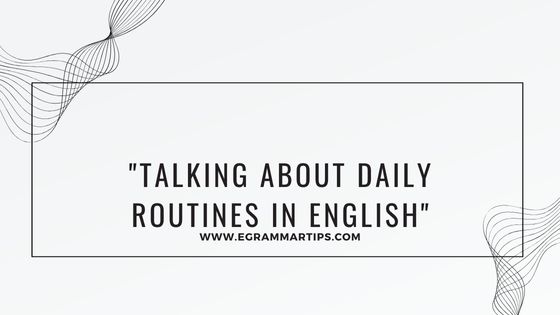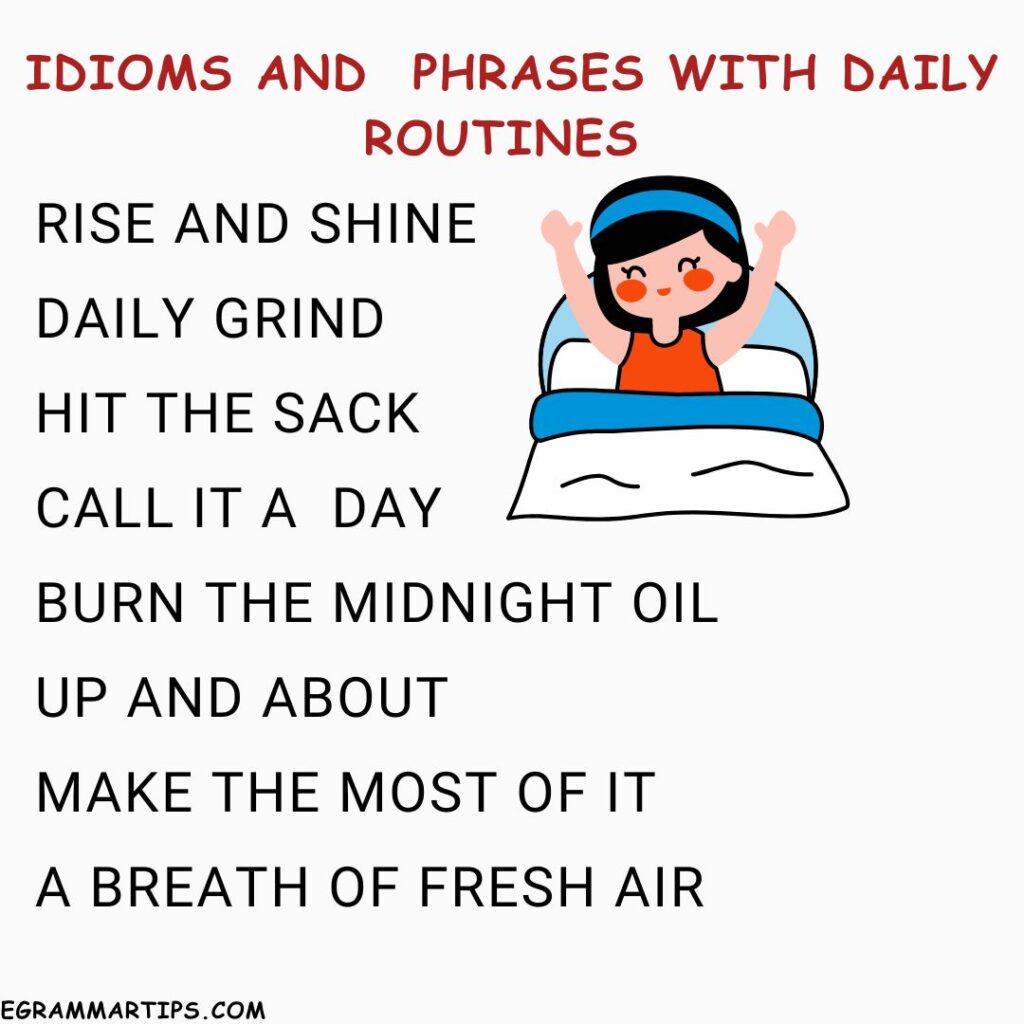
Mastering English begins by acquiring the skill to discuss one’s everyday activities and routines, setting a strong foundation for communication abilities.Whether you are practicing with friends, in class, or by yourself, being able to describe your daily activities helps you use the present simple tense effectively. Join us for an in-depth exploration of daily routines specially designed for novice learners, offering a comprehensive learning experience like no other!
Introduction to Daily Routines
A daily routine includes all the activities you regularly do from morning until night. By learning to talk about these activities, you build a foundation for more complex conversations.
Key Vocabulary for Daily Routines
Here are some common verbs and phrases that will help you describe your daily routine:
Wake Up
Get up
Brush teeth
Wash face
Take a shower
Have breakfast
Go to work/school
Have lunchWork/study
Go home
Have dinner
Watch TV
Go to bed

Morning Routine
Wake Up and Get Up
I wake up at 7 AM every day. I get up a few minutes later and start my morning
Brush Teeth and Wash Face
After getting up, I brush my teeth and wash my face to feel fresh and ready for the day.
Take a Shower
Next, I take a shower. This helps me wake up completely and feel clean.
Have Breakfast
For breakfast, I usually have a cup of coffee and some toast. Sometimes I have cereal or fruit.
Midday Routine
Go to Work or School
I leave for work/school at around 8 AM. I usually take the bus or drive my car.
Work/Study
I arrive at work/school by 9 AM. In the morning, I work on important tasks or attend classes.
Have Lunch
I take a lunch break at around 12 PM. I often eat a sandwich or a salad.
Continue Work/Study
After lunch, I continue working or studying until the end of the day.
Evening Routine
Go Home
I finish work/school at 5 PM and head home. I usually get home by 6 PM.
Have Dinner
For dinner, I cook something simple like pasta or rice with vegetables.
Relax and Leisure Activities
After dinner, I relax by watching TV, reading a book, or spending time with my family.
Go to Bed
I usually go to bed at around 10 PM to get a good night’s sleep.
Tenses Used When Talking About Daily Routines in English
Present Simple Tense
The present simple tense is used to describe actions that happen regularly or habitually. It’s the most common tense for discussing daily routines.
Structure:
For most verbs:
[Subject] + [Base Form of the Verb]
For he, she, it: [Subject] + [Base Form of the Verb] + s/es
Examples:
I wake up at 7 AM.
She brushes her teeth every morning.
He takes the bus to work.
Negative Sentences in Present Simple Tense
To make a negative sentence in the present simple tense, use “do not” (don’t) or “does not” (doesn’t) before the base form of the verb.
Examples:
I do not (don’t) wake up early on weekends.
She does not (doesn’t) drink coffee in the morning.
Questions in Present Simple Tense
To ask questions in the present simple tense, start with “do” or “does,” followed by the subject and the base form of the verb.
Examples:
Do you wake up at 6 AM?
Does he go to work by bus?
A Day in the Life of Alex: A Story About Daily Routines
Meet Alex, a young professional who thrives on routine. His day starts at 6:30 AM with the chirping of birds. After stretching, he brushes his teeth, washes his face, and takes a refreshing shower. Breakfast is a nutritious bowl of oatmeal and a glass of orange juice, enjoyed in the quiet morning.
By 7:30 AM, Alex is ready to catch the bus to work, where he listens to podcasts during the commute. Arriving at the office by 8:30 AM, he begins his day by checking emails and planning tasks. He enjoys his job as a marketing analyst, focusing on important projects in the morning. Lunch at noon is a sandwich and salad, providing a chance to chat with coworkers.
Afternoons are busy with meetings and collaborative sessions. By 5 PM, Alex heads home, looking forward to his evening. He cooks dinner—tonight, it’s grilled chicken with vegetables—and relaxes by watching TV.
At 9 PM, Alex winds down by reading a book. By 10 PM, he’s ready for bed, reflecting on his day and planning for tomorrow. With a sense of satisfaction, he drifts off to sleep, ready to embrace a new day.
Common Idioms and Phrases with Daily Routines
Rise and Shine
Meaning: To wake up and get out of bed energetically.
Example: “Come on, kids, rise and shine! It’s time for school.”
Daily Grind
Meaning: The routine of daily work.
Example: “Sometimes the daily grind can be tiring, but it’s necessary.”
Hit the Hay/Sack
Meaning: To go to bed.
Example: “I’m exhausted. I think I’ll hit the hay early tonight.”
Call it a Day
Meaning: To stop working on something for the day.
Example: “We’ve done enough work. Let’s call it a day.”
Burn the Midnight Oil
Meaning: To stay up late working on something.
Example: “I had to burn the midnight oil to finish that project.”
Up and About
Meaning: Out of bed and moving around.
Example: “Despite feeling sick, he was up and about by 7 AM.”
Make the Most of It
Meaning: To use something to the best advantage.
Example: “Even if you only have a short break, make the most of it and relax.”
A Breath of Fresh Air
Meaning: A refreshing change.
Example: “A walk in the park is a breath of fresh air after a long day at work.”

Practice Exercise
Fill-in-the-Blanks:
I _____ (wake up) at 7 AM.
She _____ (brush) her teeth every morning.
We _____ (have) lunch at noon.He _____ (watch) TV before bed.
Answer Key:
wake up
brushes
have
watches
Conclusion
Mastering how to talk about your daily routine is an essential step in learning English. By practicing the vocabulary and phrases regularly, you’ll become more confident in your speaking and writing abilities. Keep practicing, and soon describing your daily activities in English will become second nature!